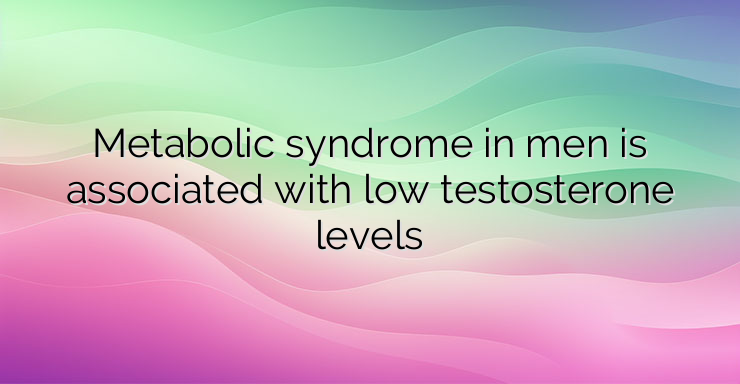Metabolic syndrome is a group of interrelated risk factors known to increase the likelihood of developing type 2 diabetes and cardiovascular disease. The condition is mostly seen in cases of low activity, sedentary lifestyle and obesity, but in some cases it is due to hormonal imbalance. Although there is some debate in the scientific community about whether metabolic syndrome should be defined as a separate condition, there is certainly more than enough concern about the disorders it can cause. Epidemiological studies have shown an association between low testosterone levels in men and the development of metabolic syndrome. Male metabolic syndrome due to androgen deficiency is a growing problem worldwide. Hypogonadism in men is a condition in which the body does not produce enough testosterone. This condition may be present from birth or may develop at some point in life, usually due to infection or injury. Testosterone replacement therapy has the potential to help the condition, but this depends on the cause of the hypogonadism and at what stage in life it was developed. Risk factors for the occurrence of metabolic syndrome Metabolic syndrome is diagnosed in men in cases where three or more of the following risk factors are present: A large amount of abdominal fat (visceral type of obesity); Low HDL cholesterol levels of less than 40 mg/dl or taking medications for low HDL cholesterol levels, including niacin or fibrates; Elevated triglyceride levels above 150 mg/dl or taking medications for high triglyceride levels such as niacin or fibrates; Blood pressure above 180/85 mmHg (arterial hypertension) or taking medication for high blood pressure; Fasting blood sugar above 100 mg/dl or taking diabetes medication. On their own, each of these risk factors brings its own set of problems. In combination, they can double the risk of developing cardiovascular disease, leading to heart attack and stroke, as well as fivefold the risk of developing diabetes. Men with metabolic syndrome are at increased risk of developing androgen deficiency. A vicious cycle is possible, as hormonal imbalance can cause metabolic syndrome, and metabolic syndrome can cause further hormonal imbalance. In the presence of these risk factors, regular testing of testosterone levels is recommended. Symptoms of metabolic syndrome Usually, men affected by metabolic syndrome experience very few symptoms at the beginning of the disease, which is why it can sometimes go unnoticed until certain disorders have developed in the body. When they do occur, common symptoms when metabolic syndrome is fully developed may include:High blood sugar levels; High blood pressure; Obesity; Cardiovascular diseases; Increased urination; Increased thirst; Blurred vision; Fatigue. Symptoms of hypogonadism Hormonal imbalance in men may cause the following symptoms: Depression; Fatigue; Loss of libido; Reduced muscle mass; Decreased bone mass; Erectile dysfunction; Hot flashes; Loss of body hair. Sometimes these problems overlap with aging and are mistaken for normal. References: 1. Corona G, Mannucci E, Forti G, et al. Hypogonadism, ED, metabolic syndrome and obesity: a pathological link supporting cardiovascular diseases 2. Alberti KG, Zimmet P, Shaw J. Metabolic syndrome–a new world-wide definition. A Consensus Statement from the International Diabetes Federation 3. Kalyani RR, Dobs AS. Androgen deficiency, diabetes, and the metabolic syndrome in men


Leave a Reply